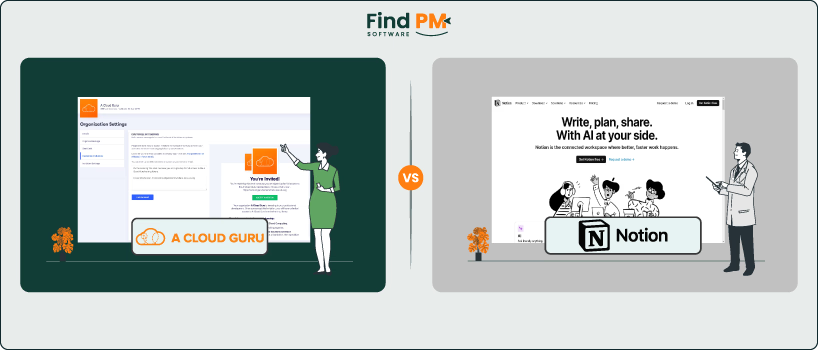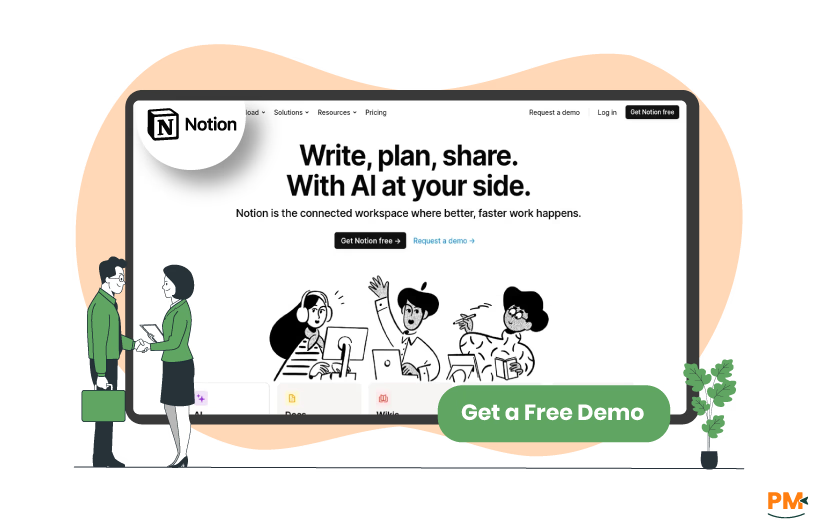
Organizing and accessing information has always been essential for teams. In traditional setups, documents and instructions were scattered across different channels, making it difficult to maintain accuracy and consistency. This challenge has led to the rise of modern knowledge and collaboration platforms, each offering its own way to centralize and manage information.
Guru and Notion approach this problem differently. Guru is designed as a structured knowledge system that stores and verifies information for use within daily workflows. Notion serves as a flexible workspace where teams can create documents, manage tasks, and build shared databases. Guru emphasizes accuracy and reliability of knowledge, while Notion prioritizes customization and broad collaboration features.
This comparison examines the two tools across key areas such as features, usability, integrations, and pricing. So, teams can evaluate which option aligns more closely with their needs.
Category | Guru | Notion |
Project Planning | Templates for timelines, status, communication, launches; focuses on documentation, not task tracking | Full project planning with boards, calendars, timelines, tasks, and dependencies |
Workflow Management | Verified content in daily tools; SME reviews; no full task automation | Custom workflows via databases; tasks, Kanban boards, real-time editing |
Customer Support | Knowledge base, email, chat; Enterprise adds success manager | Knowledge base, tutorials, community, email; higher tiers add priority support |
Collaboration | Create/share/verify cards; SMEs ensure accuracy; integrated sharing | Real-time editing, comments, mentions; internal/external sharing |
Cross-Platform | Web, extensions, Slack/Teams/Gmail, iOS and Android apps | Web, desktop, iOS and Android apps; offline sync |
Ease of Use And UI | Card-based system; quick search; workflow integrations | Block-based modular UI; drag-and-drop layouts; highly flexible |
Security | SOC 2 Type II; encryption; role-based access; SSO | SOC 2 Type II; encryption; SSO, SCIM, granular permissions |
Templates | Cards/collections with verification workflows; AI search | Extensive template library (wikis, guides, hubs) |
Relational Linking | Tags, categories, cross-references (no relational DB) | Relational databases with dynamic links |
AI And Automation | AI search, suggestions, verification reminders, triggers | Notion AI for drafting, summarizing, Q&A; semi-automation |
Integrations | Slack, Teams, Gmail, Chrome, Salesforce, Zendesk, Google Drive | Google Drive, Slack, Jira, Zoom, Figma; API and Zapier |
Pricing | Self-Serve: $25/seat/month; Enterprise: custom | Free ($0), Plus $12/member/month, Business $24/member/month, Enterprise (custom) |
Best For | Medium–large teams, SaaS/support/sales, accuracy-focused organizations | Small teams/startups, creative/product industries, distributed organizations |
TL; DR: Guru excels as a specialized knowledge management system, offering verification and structured knowledge delivery inside workflows. Notion stands out for its flexibility and customization, making it a strong choice for teams wanting an adaptable workspace that combines knowledge bases with other needs.

Guru is a knowledge management platform built to keep internal information accurate and accessible. Its core strength lies in storing and verifying content, such as policies, FAQs, and workflows, and then delivering it directly inside the tools employees already use. With browser extensions, AI-powered answers, and integrations for platforms like Slack, Teams, and Gmail, Guru brings accurate information directly into daily workflows. It ensures that verified knowledge appears in context, reducing time spent searching and improving reliability across teams.
Guru Pros And Cons
Pros | Cons |
|
|

Notion is a flexible digital workspace that goes beyond static knowledge storage. Its block-based structure allows teams to build customizable pages. Its databases provide multiple views, tables, boards, calendars, and timelines, for dynamic project and task management. Notion functions as both a documentation hub and a planning tool, enabling teams to create, organize, and collaborate on content in real time.
Notion Pros And Cons
Pros | Cons |
|
|
Guru
Guru offers subscription-based pricing with plans tailored for different organizational needs. The structure is designed to provide core knowledge management features at the entry level, with more advanced capabilities available in higher tiers.
Plan | Price | Key Features |
Self-Serve |
| Custom AI knowledge agent, customizable intranet, AI native, and verified knowledge |
Enterprise |
| All features of Self-Serve, dedicated success manager, SSO, enterprise integrations, SLA guarantees, advance governance controls |
Notion
Notion uses a tiered pricing model that starts with a free option and scales to paid plans for businesses and enterprises. Each tier unlocks more advanced functionality to support different levels of usage.
Plan | Price | Key Features |
Free | $0/member/month | Basic forms, basic sites, pages, file uploads up to 5 MB, 7-day page history |
Plus | $12/member/month | Everything in free plus unlimited collaborative blocks, file uploads, 30-day page history |
Business | $24/member/month | Everything in Plus and advanced security, 90-day page history, SAML SSO, private team spaces |
Enterprise | Custom | Everything in business plus enterprise security, audit log, domain support, unlimited page history Compliance integrations (DLP, SIEM) |

Guru is best suited for organizations that need accurate, verified knowledge delivered within daily workflows. Its design focuses on keeping information current and accessible, making it a strong choice for companies where employees depend on quick, reliable answers.
Best Suited For:
- Medium to large teams that can benefit from the 10-seat minimum requirement and scale knowledge across departments
- Customer-facing industries such as SaaS, support, and sales, where delivering consistent and accurate responses is critical
- Enterprises with fast-changing knowledge require verification workflows to prevent outdated information from circulating
- Teams working across multiple platforms like Slack, Microsoft Teams, Salesforce, and Zendesk, needing knowledge embedded directly in their tools
- Organizations prioritizing accuracy over flexibility, where knowledge trust and verification are more important than customization
In short, Guru is best for companies that want to unify their knowledge base into a single source of truth, verified by experts, and accessible wherever employees work.
Notion is well-suited for teams that need flexibility and customization in how they plan and maintain knowledge. Unlike rigid knowledge management systems, it adapts to a wide range of use cases, from lightweight documentation to complex wikis. This makes it a practical option for organizations that want one tool to handle multiple knowledge-related needs.
Best Suited For:
- Small teams and startups that want a free or low-cost tool to set up wikis, handbooks, and basic knowledge hubs
- Creative and product-driven industries, such as design, marketing, and software development, where documentation, brainstorming, and collaboration often overlap
- Cross-functional organizations needing shared knowledge spaces that support both structured content and flexible layouts
- Enterprises requiring scalable documentation with advanced security, permissions, and admin controls offered in higher plans
- Distributed teams that rely on real-time collaboration and need one platform to centralize updates across multiple locations
In short, Notion works best for organizations that want a knowledge management platform that doubles as a customizable workspace, supporting both individual creativity and enterprise-wide documentation.
Choosing between Guru and Notion ultimately depends on how your organization values knowledge. Both platforms are effective knowledge management platforms, but they serve different types of organizations. If accuracy and verification are non-negotiable, Guru provides a structured way to keep information consistent. If flexibility and customization are more important, Notion offers the freedom to design knowledge spaces to fit diverse workflows.
In short, Guru is the stronger performer for knowledge accuracy at scale, while Notion is the better choice for adaptability and all-in-one knowledge spaces.
Different teams have different workflows and priorities. While Guru and Notion cover most documentation and collaboration needs, some teams may need tools with advanced task management or automation features. The following alternatives offer diverse options to match varying project and knowledge management requirements.
Alternatives To Notion
If Guru doesn’t fully match your requirements, there are several other knowledge management platforms worth considering:
- Confluence software – A popular Atlassian tool for building team knowledge bases and documentation
- Tettra – Knowledge management designed specifically for growing teams with Slack integration
- Slab – A modern wiki tool for internal documentation and team knowledge sharing
- Bloomfire – Knowledge sharing software with strong content search and analytics
Alternatives To Notion
If Notion’s flexibility feels excessive or not aligned with your needs, here are some other options:
- Coda – A flexible workspace tool combining docs, spreadsheets, and apps
- Airtable – A database-focused collaboration tool that can double as a knowledge hub
- Evernote Teams – A straightforward documentation and notes solution for smaller teams
- ClickUp – Project and knowledge management combined in one workspace
These alternatives provide reliable options for teams that find Guru or Notion unsuitable, ensuring there is a solution for every knowledge management need.
